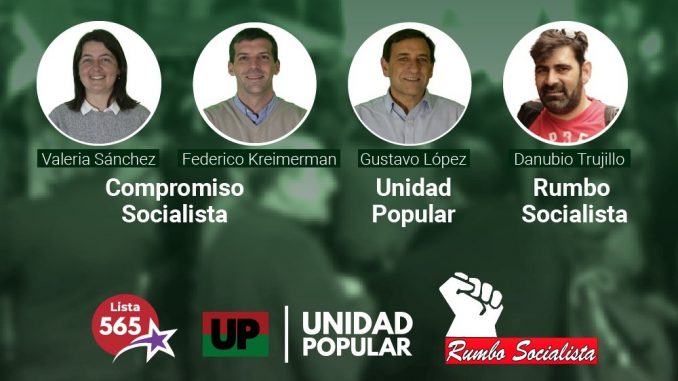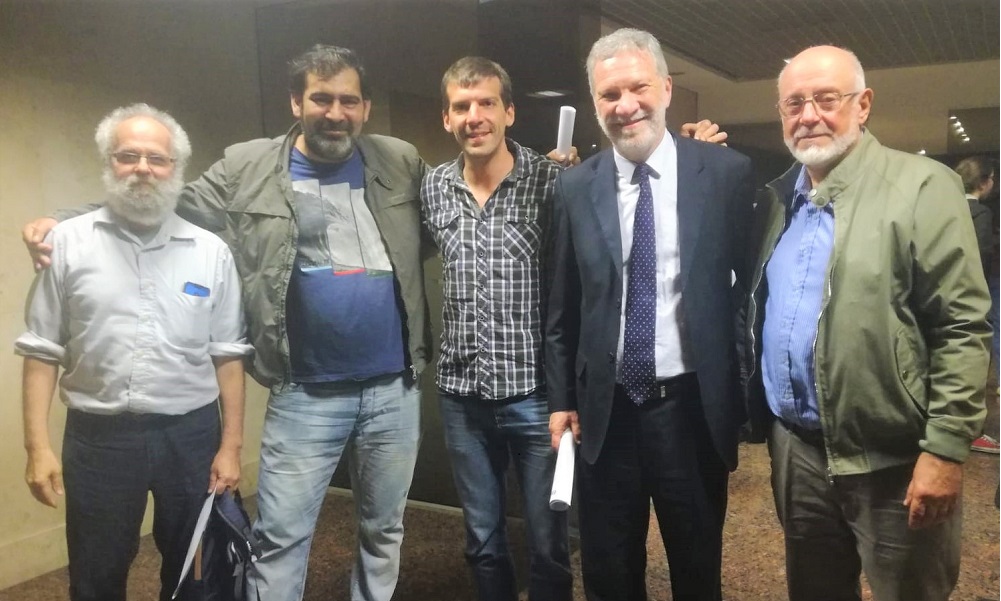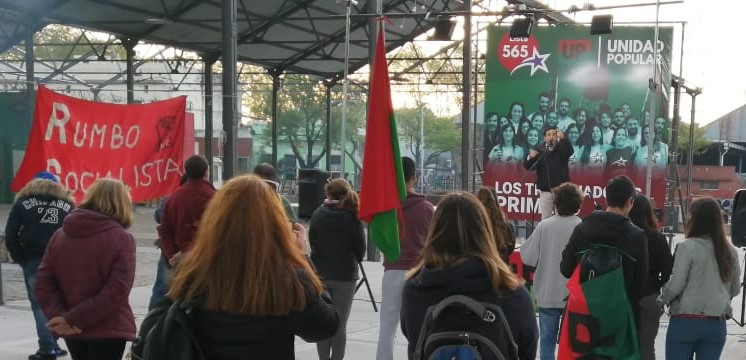
After the primary elections, in which we supported and endorsed Compromiso Socialista, political organization that is part of Unidad Popular (UP), explaining the reasons that led us to take that political position, this time we decided to not only endorse the 565 Comprmiso Socialista list, but also to integrate the list with several comrades. Not only in Montevideo, but also in the provinces. This does not change our position to continue outside UP (because we have strategic differences its predominant political perspective and its actions), but we understand that the experience of the primary elections with Compromiso Socialista was highly favorable in the sense of advancing in the construction of a revolutionary alternative, of a socialist project, that raises the historical program of the working class, and also works in a non-sectarian way for the unity of revolutionaries. For us, this implies an important and necessary step in that sense, in that construction, which does not end with the national elections, but begins the following day.

These
elections are charged with the very special Latin American framework, in which
the masses go through rapid experiences and become disillusioned with the
different leaderships that do not meet their expectations.
In our country, the political parties that dispute
the government, though with different characteristics and different ideological
roots, are not so different when it comes to what program to apply. Both the
current government party and the opposition focus their campaigns on how to
manage the crisis, reduce the fiscal deficit and maintain the investment grade;
on such important issues as environment, health care, housing, education,
social security, there are no differences large enough to differentiate them
when governing the country.
Without forgetting their background and without
entering into a thorough analysis of the different ideological currents that
are in conflict in this electoral contest, we can say in a few words and
focusing on the real problem, that whoever wins will no doubt center on how to
manage the crisis, increase the rate of profit of the ruling class, reduce
wages and attack the conquests of workers, as well as maintain tax breaks for
large capitalists.

Some of these
measures are already in place today. The last three years the current
government has tipped wages councils to the employers´ side and favored low
raises, which has objectively meant wage losses in several cases and barely
maintaining workers´ purchasing power in others. In addition to there has been
a loss of more than sixty thousand real jobs, hundreds of companies have closed,
and job creation is precarious, either through outsourcing jobs that should be
permanent in the state and in private activity, as well as with the new
modality of work through virtual platforms without any regulation.
Regarding the education issue, there was not only
a break from what was promised by the government party in the previous
elections, but the curricula in public education has also deteriorated more
than it already was. Not only has education been commercialized, but there are
plans to continue with a program of deterioration of public education and tax
breaks for private schools.
With the environment, slogans are raised that go
against what is being done, since there is talk of caring for the environment,
of legislating and advancing in that direction, but the legislation very poor.
As proof, we have a law that banned plastic bags that were given in different
stores and in return forced companies to sell biodegradable bags by
transferring their cost to consumers. At the same time, they signed a contract
to install a third paper mill that has the support of the main political
parties that can win the government, the differences between them being barely
administrative. They thus continue the deterioration of our environment. In
addition to this, the recent Law on Irrigation was approved, which benefits private
companies, as well as the lack of controls on pesticide spraying that has been
deteriorating our soil for years.
In health care, the reform that was implemented since 2007 transformed public health care into an integrated and mixed public-private mutual system that ended up favoring large medical corporations and has nothing to do with the project of workers of a Free National State and Public Health System. Though with FONASA it was possible to cover a high percentage of people who did not have health care either because of their resources or because they were not within the contribution system, the extension of health are did not result in an improvement of its quality, but rather deepened its commercialization.
Housing is another necessity that none of the government programs of the different parties touches. The current government did not place it among its priorities either. It has simply been left in the hands of speculators and tax exemptions have been generated for private individuals who entered the so-called social housing plan that is inaccessible to workers.
Social security is one of the most important issues of general interest in the working class. It seems that there is a pact between the parties to advance toward a reform that will in no way be favorable to the interests of the working class. On the contrary, they seek to reduce the fiscal deficit by lowering the pensions and extending the age of contributions by changing the replacement rate. All this is in detriment of retirement income. And it does not attack the mixed system that continues to maintain the AFAPS and the individual savings system, which has allowed the private sector to profit from workers´ contributions.
Regarding women´s struggle for the recognition of rights against patriarchal culture, though there has been legislation in that sense and it can be said that both in this and in the matter of the defense of the LGBT movement, progress has been made in legislation, when implementing these advances, it is impossible to do so if it is not included in the budget. But we do not stop there. We understand that we must continue to fight for equal rights and, above all, to combat sexist violence that day after day continues to kill women with impunity, because the state does not exercise its proper role to guarantee not only rights but also to protect the lives of innocent women who end up being killed.
Finally, in conjunction with the elections, a plebiscite will take place to reform of our constitution to allow the armed forces to be used in repression through the creation of a national guard to intervene in “case it becomes necessary”, as they say. This broadens their interference in matters that correspond to the Ministry of the Interior. But they already do so at the border, where they have the power to act in a range of 30 km in tasks that were assigned by the current government. This strengthens our position not only against the reform, because we also understand that it is necessary to dismantle the Armed Forces, which, educated under the slogan of the defense of the homeland, maintain the idea of repressing our people with total impunity in full force.
With this panorama, the need to build an alternative that raises another voice not only in the parliament but also in organized struggles becomes imperative. We understand that it is necessary to do this in unity and with a common program, an issue that we share in general terms with the Compromiso Socialista comrades with whom we have been working with in recent times and with whom we agree politically.
In all the aforementioned issues, the left has proposals that are expressed in the list 565 of Compromiso Socialista, which is also integrated by out comrades. It is necessary to make them known, to end the false proposals of the other parties that only go in the direction of deepening the crisis and continue carrying the weight of it on the shoulder of the working class.
In that sense, we politically value the joint rally campaign, in which Compromiso Socialista and our Rumbo Socialista have converged. Not only sharing a common stage and positions, but above all, initiating a process of unification with political and social perspectives.
We call on everyone to vote for the left with the 565 list on October 27, which is a useful vote that defends the interests of the working class. Keeping in mind that it is not an end in itself, but that it is also a call to form a revolutionary alternative to face the coming times.
Rumbo Socialista








